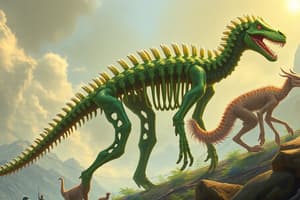Podcast
Questions and Answers
What is the first known form of life that emerged approximately 3.5 billion years ago?
What is the first known form of life that emerged approximately 3.5 billion years ago?
- Eukaryotes
- Prokaryotes (correct)
- Archaea
- Viruses
Which mechanism of evolutionary change involves the random change in the DNA sequence of a gene?
Which mechanism of evolutionary change involves the random change in the DNA sequence of a gene?
- Genetic mutation (correct)
- Genetic drift
- Gene flow
- Gene duplication
What type of evidence of evolution compares body structures between different species to identify similarities and differences?
What type of evidence of evolution compares body structures between different species to identify similarities and differences?
- Molecular phylogenetics
- Embryology
- Comparative genomics
- Comparative anatomy (correct)
Which classification rank comes immediately after kingdom in the taxonomic hierarchy?
Which classification rank comes immediately after kingdom in the taxonomic hierarchy?
Which process involves the transfer of genetic material between different populations, leading to increased genetic diversity?
Which process involves the transfer of genetic material between different populations, leading to increased genetic diversity?
What does the fossil record primarily provide evidence for in the context of evolution?
What does the fossil record primarily provide evidence for in the context of evolution?
Study Notes
Biological Sciences
History of Life on Earth
Life on Earth has a vast history spanning billions of years. The first known forms of life emerged approximately 3.5 billion years ago, with the existence of prokaryotes, simple cells without nuclei, such as bacteria. Over time, life evolved into multicellular organisms, eventually leading to the emergence of complex creatures and ecosystems.
Mechanisms of Evolutionary Change
The processes driving evolutionary change involve numerous mechanisms, including genetic mutation, gene flow, gene duplication, and genetic drift. Through these mechanisms, populations adapt over time to changing environments, leading to the formation of new species.
Evidence of Evolution
Evidence supporting the theory of evolution includes the fossil record, comparative anatomy, embryology, and molecular biology. Fossils reveal patterns of change in organisms over time, while comparative anatomy and embryology highlight similarities between distantly related species. Molecular biology provides insights into the genetic connections between various organisms.
Classification/Taxonomy
Organisms are classified into a structured hierarchy, known as a taxonomy, which consists of increasingly specific ranks. This hierarchical organization starts with the domain, followed by the kingdom, phylum, class, order, family, genus, and finally species.
Patterns of Decent Modification
Phylogenetic trees represent the evolutionary relationships between organisms by depicting the branches and splits corresponding to the shared ancestry patterns. These diagrams help to trace the evolutionary paths of species and estimate the timescales of various events in the tree of life.
It is essential to recognize that phylogenetic trees emphasize the historical relationships between organisms rather than their current ecological roles or functional similarities. They also serve as valuable tools for researchers to investigate the diversification of life and to make predictions about undiscovered species.
Studying That Suits You
Use AI to generate personalized quizzes and flashcards to suit your learning preferences.
Description
Test your knowledge of the history of life on Earth, mechanisms of evolutionary change, evidence of evolution, classification/taxonomy, and patterns of descent modification in this quiz. Explore concepts such as genetic mutation, fossil records, phylogenetic trees, and the hierarchical organization of taxonomy.




